Aged Egg Yolk: A Fusion of Egg and Koji Fungus
The Secret of Great Taste
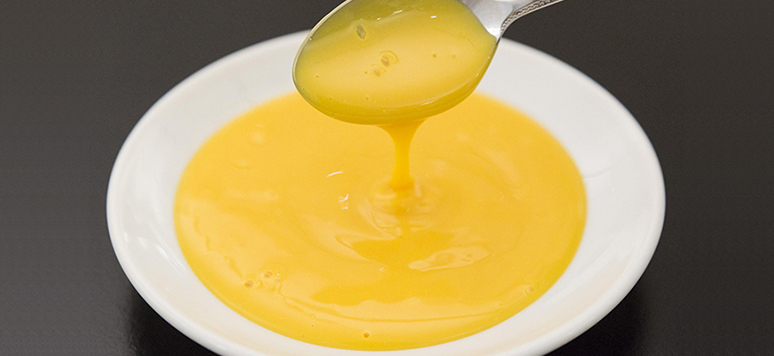
*Based on information available as of July 2019.
The Kewpie Group has developed an original raw material: aged egg yolk.
Aged egg yolk is a raw material developed independently by the Kewpie Group through a process that uses egg koji to age yolk, drawing out its umami.
Koji fungus (Aspergillus oryzae) is well known in Japanese cuisine for its role in products like miso and shio koji seasoning, and it has the ability to draw out umami. In the same way, using koji to age yolk increases the umami and richness, and enhances their distinctive taste and aroma.
Aged yolk arose from the Kewpie Group’s high standards for ingredients.
The keys to the distinctive great taste of aged yolk are the egg koji and the aging conditions.
In the same way that miso is made by aging soybean with soybean koji, we aged the yolk using egg koji.
At the outset of development, we tried to age the yolk using the standard rice koji and soybean koji, but this resulted in a flavor similar to miso, which was not what we were aiming for. We wanted a new, original ingredient that would draw out the umami and richness of the yolk while retaining its distinctive great taste. In order to achieve this, we needed a new type of koji.
To that end, we began working together with koji starter manufacturer, Higuchi Matsunosuke Shoten Co., Ltd., which has spent many years in the continuous research of koji fungus, to develop a new koji from eggs.
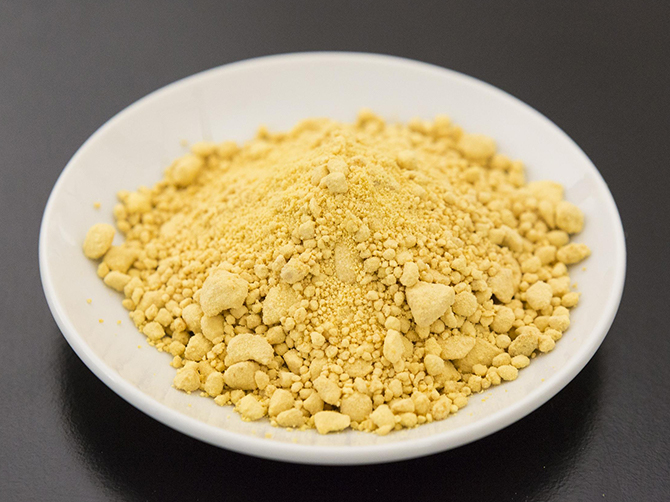
Our egg koji.
It turns out that it is not possible to make koji from egg using conventional methods. Also, the koji fungus strain that you select has a significant effect on the flavor of the aged yolk. But thanks to the cooperation of Japan’s leading expert in koji, Higuchi Matsunosuke Shoten, we were able to overcome these difficulties and develop an egg koji. With the shared desire to create a new koji, we persevered together through trial and error until we arrived upon our own original method.
We carefully investigated the aging conditions necessary to age yolk using egg koji. If the temperature during aging is too low and the time is too short, then the umami and richness are insufficient. On the other hand, if the temperature is too high and the period is too long, it allows components that cause bitterness or unpleasant odors to develop.
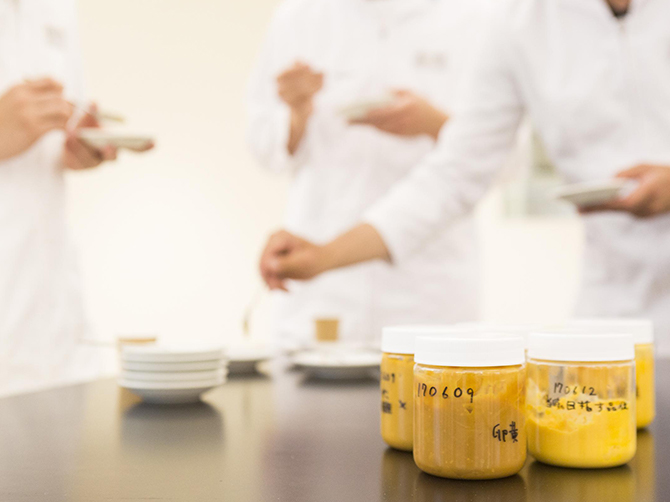
There are infinite combinations of koji fungus strains and aging conditions. In order to achieve a distinctive great taste, we repeated the cycle of trial production, taste testing, analysis, and evaluation countless times until we finally reached the best possible combination for aged yolk.
Since the Kewpie Group was first founded, we have been believing that good products begin with good ingredients. The series of difficulties involved in creating this new ingredient was beyond what we had expected, but we prioritized our belief in quality as we continued to challenge ourselves. About four years after project ideation, we were finally able to create egg koji and aged egg yolk.
Aged egg yolk contains more of the components that make them taste better than standard yolk does.
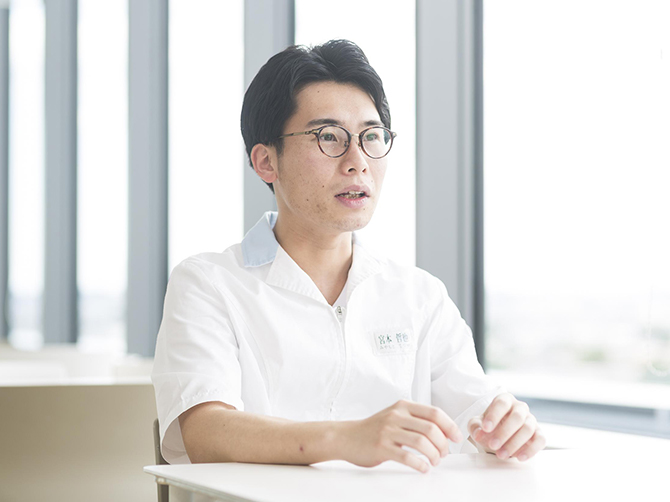
Tetsuya Miyamoto
(Fermentation & Microbe Research Team, Functional Materials Department, Institute of Technology Solutions, R&D Division)
To build the food culture of the future, we are working day by day to develop new raw materials and new technologies with fermentation as the jumping off point.
Over the many years we have spent researching eggs, we have also researched the components that make them taste great. Using aged yolk in egg dishes can highlight the egg flavor. This is because, compared to standard yolk, aged yolk contains more of the components that make it taste good. In comparison, aged yolk contains more of both the "taste" components perceived with the tongue and the "aroma" components perceived with the nose.
We conducted machine analysis of the amino acids and aroma components contained in aged egg yolk. The results are shown below.
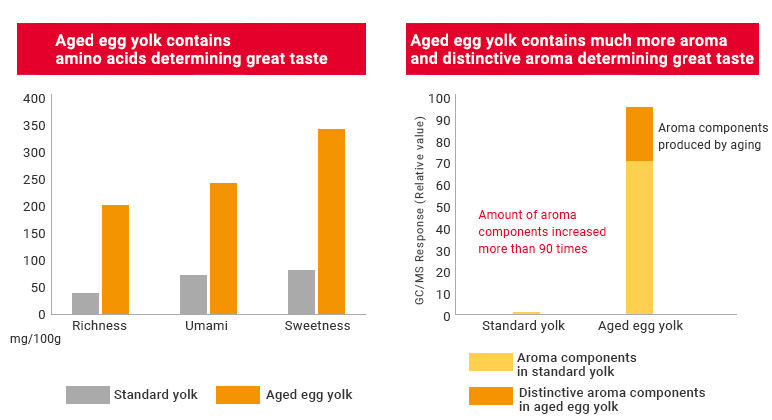
Amino acid analysis showed that aged egg yolk contains about five times more amino acids than standard yolk does.
Also, not only is aged egg yolk significantly more aromatic, but it also has a new aroma. The aging process creates the new aromatic notes described below, giving aged egg yolk its own distinctive aroma.
<The new aroma created by aging yolk>
- The rich aroma of egg
- A cheese-like aroma
- A toasty aroma similar to miso, soy sauce, or other aged ingredients
- A sweet, caramel-like aroma
- A honey-like aroma
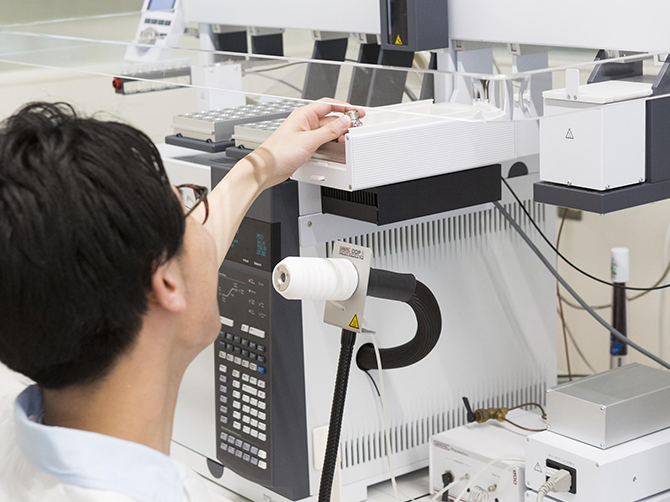
An aroma analysis machine. The cylinder in the center is used to confirm the aroma of the substances in the samples.
Sensory evaluation of carbonara sauce made with aged egg yolk
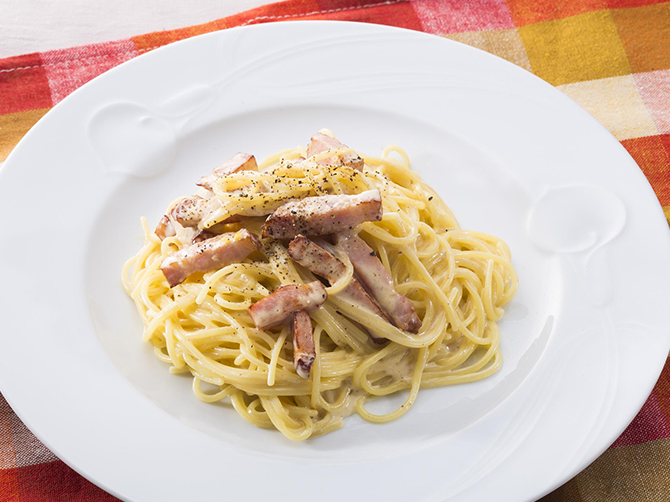
The photo shows a plate of spaghetti carbonara made with aged yolk. The egg yolk flavor is stronger than a carbonara sauce made with standard yolk. It also highlights the cheese flavor more prominently and lends richness.
We conducted sensory analysis of the flavor differences.
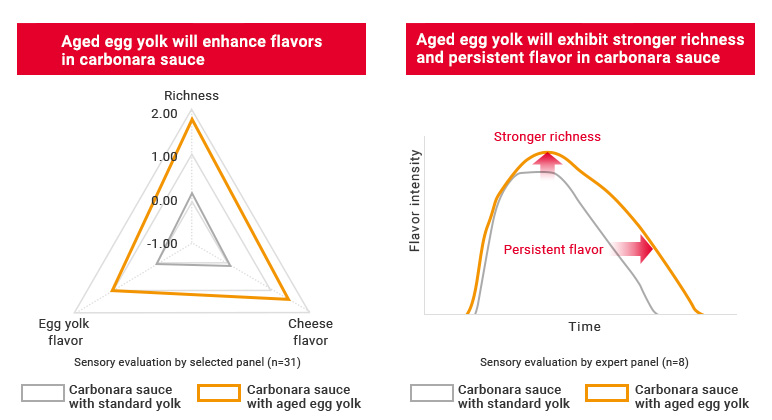
The results showed that, compared to a carbonara sauce made with standard yolk, one made with aged egg yolk has a richer taste as well as stronger egg and cheese flavors. Tasters found that those flavors were strongly present immediately after taking a bite, and they also evaluated the flavor as long lasting.

A scene from the sensory evaluation.
Researchers who had surpassed a certain standard in the taste test isolated themselves in the stable environment of a walled booth where they could focus on the evaluation (the Sensory Evaluation Room), and there they evaluated dishes made with and without aged yolk in a blind test.
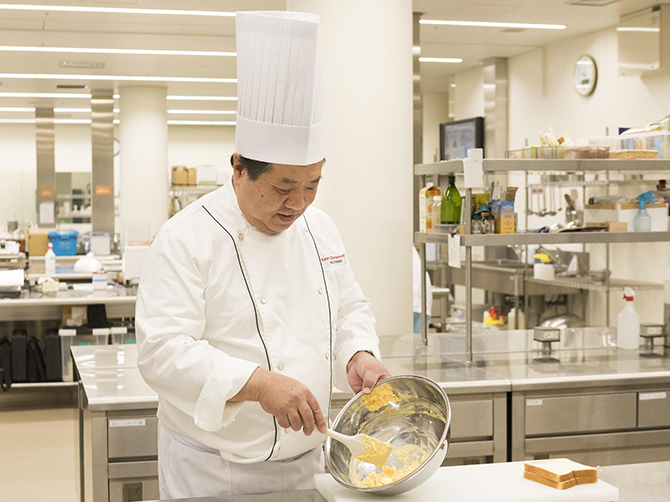
Our corporate chef making a trial dish using aged egg yolk.
According to the evaluation of our corporate chef, who tried out aged egg yolk in a variety of dishes, "They can be used with eggs, meat, fish, vegetables, or any other ingredient, and they have the versatility for many different dishes. Using aged yolk achieves a depth of flavor and adds value to the dishes."
As described above, we went through a variety of processes of trial and error in order to create the raw material aged egg yolk. In the future, we will continue to promote research into aged yolk, with its distinctive taste and aroma, and we hope that this will lead to proposals for new great tastes. We believe aged egg yolk will create new categories in food culture, opening the door to a truly better and happier life.


